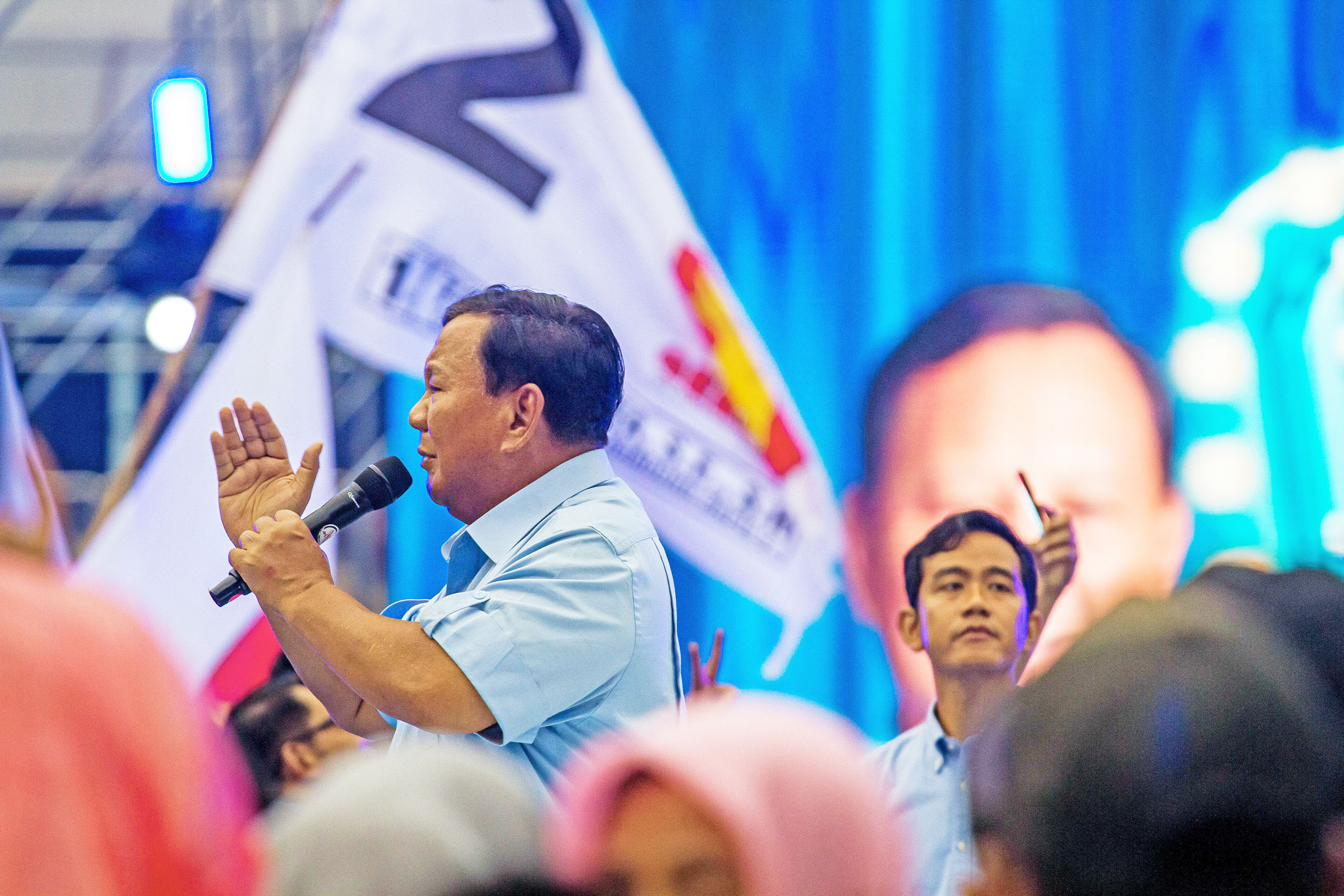As Indonesians prepare to cast votes for a new president today, the question isn’t whether defence minister Prabowo Subianto will win, but how.
Prabowo and his running mate, president Joko Widodo’s eldest son Gibran Rakabuming Raka, need to get more than 50 per cent of the vote to avoid a late June run-off with the second-placed candidate. Opinion polls put them just above this threshold, or tantalisingly close to it.
Jokowi, as the current president is known, hopes to extend his dynastic foothold in the system by supporting the Indonesia Solidarity Party, or PSI, which is trying to enter parliament for the first time under the leadership of his second son, Kaesang Pangarep. PSI’s ubiquitous television adverts feature Kaesang’s image alongside that of his father, with the slogan “PSI is Jokowi’s party.”
This is no doubt news to Indonesia’s Democratic Party of Struggle, or PDI-P, which for now still counts Jokowi as a member. But a breakdown in president–party relations in 2023 accelerated Jokowi’s shift of support to Prabowo, capped with the appointment of Gibran as his running mate. PDI-P’s candidate, former Central Java governor Ganjar Pranowo, has seen his support collapse over the three-month campaign period as Jokowi’s supporter base has followed the president’s lead and defected to Prabowo.
The irony is that Jokowi’s betrayal of PDI-P in favour of Prabowo and his son’s candidacy has worked almost too well for the president’s own good. Ganjar has been overtaken for second place by former Jakarta governor Anies Baswedan, a government critic who maintains ties to conservative Islamic opposition groups and is now attracting support from progressives who see him as the candidate best placed to challenge the Prabowo–Widodo alliance. But polls show Prabowo with a huge lead in a head-to-head with Anies, and PDI-P, despite its anger with Jokowi, would likely endorse Prabowo in a second round in exchange for an advantageous deal on representation in Prabowo’s cabinet.
But Jokowi is understandably not eager to see a four-month run-off campaign that would offer Anies a platform to dial up criticisms of his policy legacy and his government’s erosion of democratic norms. Efforts by Jokowi to use the levers of state to drum up support for Prabowo have become a major point of controversy in the media. Both Ganjar’s and Anies’s campaigns have alleged behind-the-scenes intimidation of voters, donors and campaign workers by police and other officials.
A more above-board mode of government favouritism is occurring in plain sight. During the campaign, Jokowi has wheeled out close to US$1.3 billion worth of cash transfers and food aid, justified as an emergency response to El Niño–related disruptions to food security. Nobody sees it as anything other than a well-timed attempt to boost goodwill towards the administration — and by extension, to Prabowo and Gibran.
Jokowi wants to reduce the risk of an unexpectedly tight run-off to zero, but a hole-in-one for Prabowo isn’t without its downsides if Prabowo enters office with too forceful an electoral mandate. No non-incumbent president has won a multi-cornered contest without a run-off since the introduction of direct presidential elections in 2004.
Not only does Prabowo have a strong chance of scoring an unprecedented first-round victory. His personal-vehicle party, Gerindra, could also beat PDI-P for first place in the legislative elections — allowing it by custom to claim the strategic speakership of parliament. If all breaks well on election day, Prabowo could become the most authoritative incoming president in the democratic era.
For Jokowi, such a landslide would only bring forward the point at which Prabowo no longer owes him anything. One son in the vice-presidency and the other as the head of a minor parliamentary faction would offer him only limited avenues to push back against any effort by Prabowo to sideline the Widodos in the course of asserting his authority over the political elite.
There remains uncertainty over the ends to which that authority might then be put. Prabowo’s 2024 campaign has been premised on continuity with the Jokowi era. His television advertisements and campaign speeches have featured Gibran prominently, listing off the hugely popular social programs that have been built by the Jokowi administration and promising to continue and expand them.
Yet the hallmark of Prabowo’s political career has been shifts in his political persona and alliances to serve his presidential ambitions. In 1997–98 he posed as a bitter-ender for former president Suharto’s foundering dictatorship, forging links with a rising Islamist civil society as part of his manoeuvring to succeed his then father-in-law. In the post-reformasi era he reinvented himself as a Sukarnoist ultranationalist, then later posed as a friend of political Islam in his two unsuccessful presidential campaigns against Jokowi.
More than twenty years of trial and error have now led Prabowo to mimicry of Jokowi’s secular, technocratic populism, with very successful results. But nobody — including Jokowi — can assume that this persona will hold fast if, or when, Prabowo has at his fingertips the powers of the overbearing presidency Jokowi has created, with the added bonus of a strong electoral mandate Jokowi helped him earn.
Prabowo has lately become proud of talking about how much he has learnt from Jokowi while serving as his defence minister since 2019 — and as PDI-P knows all too well, nobody but Jokowi is a better teacher of the art of the double-cross. •




